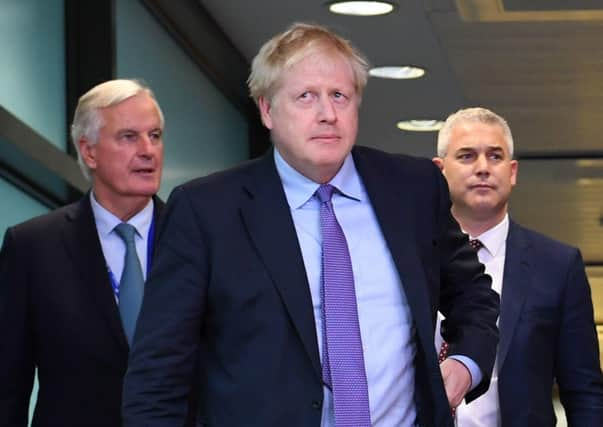Dermot Nesbitt: It beggars belief that unionists say nothing about how the NI Protocol breaches international law


But also the lack of a coordinated and consistent response by unionist leadership.
Consider the EU’s position.
Michel Barnier stated last Thursday: “The difficulty in the island of Ireland is caused by Brexit not by the Protocol.”


Advertisement
Hide AdAdvertisement
Hide AdSorry Mr Barnier, the difficulty is caused by the EU’s non-adherence to the fundamental principles of international law.
It is that simple.
Consider just two examples.
• One: The Organisation for Security and Co-operation in Europe (OSCE) comprising 57 States from Europe, Central Asia and North America.
With the demise of the USSR in 1989 and potential turmoil in Europe, it stated that one of its principles to ensure stability is “respect for internationally recognised frontiers”.
• Two: more importantly; the Council of Europe (comprising 47 European states including all 27 members of the EU, the home of the European Convention on Human Rights and the European Court of Human Rights) makes clear that a fundamental principle of international law requires respect for “the sovereign equality, territorial integrity and political independence of states”.
Advertisement
Hide AdAdvertisement
Hide AdThe protocol, however, means that the sovereign integrity of the United Kingdom no longer exists.
It is an indisputable fact that the overwhelming consensus in international law is that the best hope for stability, is to be found in respect for the territorial integrity of existing states.
Mr Barnier, your protocol falls far short of the fundamental principles of international law.
I have written for 25 years about the benefit of international law and over the past several years, I approached privately the leaders of unionism, key interviewers and political commentators in the media as well as both Irish and UK governments on this subject.
Frankly, all efforts have been a waste of time.
Advertisement
Hide AdAdvertisement
Hide AdIt is absolutely beyond belief that unionism’s leadership over the past period did not refer to the importance of international law in the context of the Council of Europe, when considering a way out of our political stalemate with the EU.
My last comment on this matter was in this paper (‘International law can clash with other law and if it does then there needs to be a balanced response,’ September 18 2020, see link below) regarding the Brexit Withdrawal Agreement being in breach of international law as stated by the Council of Europe.
This is because it separates Northern Ireland from the rest of the UK in a very maximum way, and there is no long unfettered trade within the state.
It is not enough, important as it is, to rely on the agreement.
Advertisement
Hide AdAdvertisement
Hide AdIf Mr Barnier is to feel any pressure, which is possibly doubtful, the argument must be raised to a higher level and the EU made to feel in serious error of the platitudes it espouses.
They are hypocrites.
The Council of Europe provides that platform.
And, the message must be simple, repeated at every opportunity and consistently articulated across unionism’s leadership.
One voice, one message; Mr Barnier change is needed!
Indeed, even the Belfast Agreement states that the UK government agreed: “to legislate as necessary to ensure the United Kingdom’s international obligations are met in respect of Northern Ireland.”
The government, in particular Boris Johnson, must be held to account in its fulfilment of its international obligations as stated by the Council of Europe.
Advertisement
Hide AdAdvertisement
Hide AdIn a Belfast Telegraph letter, 12 February, headed; ‘Where is unionism’s plan for an inclusive Northern Ireland?’ it stated: “We are in little doubt that a new and compelling narrative is needed that departs from the static and self-defeating attitudes of the past.”
I agree.
Indeed, compliance with international norms, not only exposes Michel Barnier, the EU and Boris Johnson but provides such a compelling narrative.
When interviewed by Sam McBride for this paper (October 1 2010) I stated: “Unionism has nothing to fear from embracing equality and human rights and articulating it along the principles of international standards and rules.”
While the UK has left the EU, it will not be leaving Europe.
The UK remains a founder member of the Council of Europe.
Advertisement
Hide AdAdvertisement
Hide AdI wish my life to be governed and based on international law that follows practices in the wider Europe.
This takes any discussion away from ‘local’ arguments and provides a basis and focus on what is needed to assist in moving towards a stable society when, hopefully, politicians can focus on the expressed needs of the whole community.
Unionism needs to speak with one voice and have a clear, simple and focused policy, argued with consistency, conviction and clarity at every opportunity, offering a message that appeals to the wider community.
In short: we wish for the same rights with associated responsibilities that are advocated elsewhere across Europe and wider afield.
Messrs Barnier and Johnson need to act accordingly.
Advertisement
Hide AdAdvertisement
Hide AdTo be blunt: I’ve held moderate views all my political career, supported the power-sharing executive of 1974 and was to the forefront in advocating support for the Belfast Agreement of 1998.
If a moderate unionist like myself is deeply angry, I worry where that leaves other strands of unionism?
• Dermott Nesbitt is a former Ulster Unionist MLA and a former junior Stormont minister and then environment minister
• Read much more on this topic below
• Dermott Nesbitt: International law can clash with other law and if it does then there needs to be a balanced response
Advertisement
Hide AdAdvertisement
Hide Ad• Peter Robinson: Unionists might face a choice between keeping Stormont or scrapping the Irish Sea border
Advertisement
Hide AdAdvertisement
Hide AdAdvertisement
Hide AdAdvertisement
Hide Ad• David McNarry: Unionists are demanding removal of the disastrous internal UK border
• Jim Allister: It may well be a choice between Stormont and the Irish Sea border, as Peter Robinson says
Advertisement
Hide AdAdvertisement
Hide Ad• Ben Lowry in 2020: Last night unionists celebrated a move towards Irish unity
——— ———
A message from the Editor:
Thank you for reading this story on our website. While I have your attention, I also have an important request to make of you.
With the coronavirus lockdown having a major impact on many of our advertisers — and consequently the revenue we receive — we are more reliant than ever on you taking out a digital subscription.
Subscribe to newsletter.co.uk and enjoy unlimited access to the best Northern Ireland and UK news and information online and on our app. With a digital subscription, you can read more than 5 articles, see fewer ads, enjoy faster load times, and get access to exclusive newsletters and content. Visit https://www.newsletter.co.uk/subscriptions now to sign up.
Advertisement
Hide AdAdvertisement
Hide AdOur journalism costs money and we rely on advertising, print and digital revenues to help to support them. By supporting us, we are able to support you in providing trusted, fact-checked content for this website.
Alistair Bushe
Editor